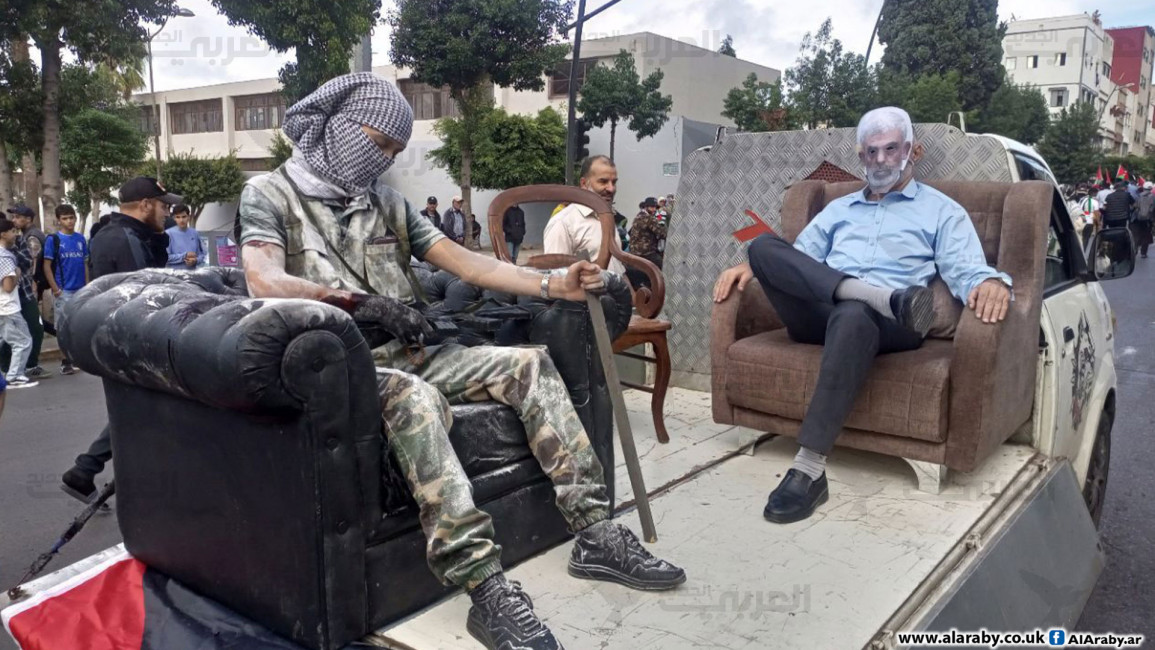Yahya Sinwar's death sparks fury in Morocco against ties with Israel, foreign embassies
In Morocco, the assassination of Hamas chief Yahya Sinwar by Israeli forces has ignited a wave of protests across the country, spilling on to the streets and stadiums. Demonstrators are increasingly vocal about their anger, with some calling for the blockade of foreign embassies as Rabat maintains diplomatic ties with Israel.
On 20 October, hundreds gathered in the streets of Casablanca, rallying in support of Palestinian and Lebanese resistance groups.
The crowd marched behind a van featuring two striking pictures of the late Hamas leader: a man dressed as Sinwar, replicating the famous image of him sitting among the ruins of his bombed house in Gaza. Opposite him, another man portrayed Sinwar holding a stick in his final moments.
"We are here for the Palestinian and Lebanese people, and for the martyr hero Yahya Sinwar," said Abdelmajid El-Raddi, a member of the National Front Against Normalisation.
Local pro-Palestine groups have also called for an immediate and permanent ceasefire in Gaza and the revocation of the normalisation agreement that Rabat signed with Tel Aviv in late 2020.
New wave of protests after Sinwar's death
Sinwar, who had led Hamas in Gaza after Israel's assassination of Ismail Haniyeh in July, was reportedly killed on 16 October while engaged in a skirmish with a group of Israeli trainee soldiers in Tal as-Sultan, Rafah.
His death sent shockwaves throughout the region, prompting thousands to take to the streets in various Arab and other capitals.
Across the Moroccan kingdom, worshippers held absentee prayers, known as Salat al-Gha'ib, for Sinwar. This Islamic funeral prayer is traditionally performed for deceased individuals when the community is unable to gather at the location of the body.
The prayers were held outside mosques, as official religious institutions did not organise ceremonies for the Hamas leader.
So far, Rabat has remained silent on the recent Israeli attacks that targeted leaders of resistance groups in both Lebanon and Palestine.
Meanwhile, football stadiums, gearing up for the Africa Cup, echoed with chants of Palestinian solidarity. On 18 October, ultras from Casablanca's Raja Club smuggled banners of Sinwar into a game, chanting their anthem "Rajawi Filstini," lamenting their inability to join the resistance in Gaza.
Morocco previously banned ultras from stadiums. However, in its efforts to secure its status as a host for international football championships, the kingdom lifted the ban in 2018, albeit with conditions—Tifos, large coordinated displays often carrying political messages, now require pre-approval by the Ministry of Interior.
Nevertheless, through the years, ultras have found ways to sneak smaller political banners into games, undeterred by the restrictions.
Rabat's normalisation with Israel continues
Protests against Israel have grown louder since its war on Gaza began. In a security precaution, Tel Aviv closed its liaison office and evacuated its officials in Rabat. Local media reported that the office reopened in August at a different location with a newly appointed mission, though neither Tel Aviv nor Rabat confirmed.
Despite widespread social media calls to blockade foreign embassies in response to Israel's killing of over 42,000 people in Gaza and pushing the strip toward famine, no major Moroccan pro-Palestinian group has endorsed this movement.
Thirteen Moroccan activists are already currently facing court for their attempt to blockade a Carrefour store, a multinational supermarket listed in the BDS boycott list, for having agreements with companies operating in illegal settlements. Pro-Palestine groups argue that the trial is "politically motivated".
Overall, Rabat has not imposed restrictions on protests against Israel—this marks a notable shift from its prior stance against anti-normalisation demonstrations before the war on Gaza.
Authorities have, however, banned "aggressively" protesters from approaching the French and American embassies on multiple occasions and have used "violence" to disrupt gatherings in front of Carrefour stores last June, according to pro-Palestine groups.
Abdelilah Benkirane, former prime minister and head of the Justice and Development Party (PJD), claimed that Rabat was moving towards banning marches and solidarity sit-ins for Palestine last October. "It saw that the political outcome of the ban would be more negative than positive," he noted in May, citing private sources.
Rabat has officially condemned Israel's "flagrant violations of international law" in its military campaign against Gaza. But, a source from the Moroccan foreign ministry confirmed to Reuters in March that Rabat continues its normalisation with Israel, arguing that there are benefits of this relationship in terms of advocating for the Palestinian people.




 Follow the Middle East's top stories in English at The New Arab on Google News
Follow the Middle East's top stories in English at The New Arab on Google News
![A group of Palestinians, foreign and Israeli activists gather to participated in an olive picking event on the land in the town of Battir, which is under threat of confiscation by Israel in Bethlehem, occupied West Bank on 8 November 2024. [Getty]](/sites/default/files/styles/image_330x185/public/2182930803.jpeg?h=199d8c1f&itok=__0LgGsa)

![People gathered around the rubble of destroyed houses to search for survivors [Getty]](/sites/default/files/styles/image_330x185/public/2024-11/GettyImages-2184733820.jpg?h=199d8c1f&itok=NiM1LO2f)